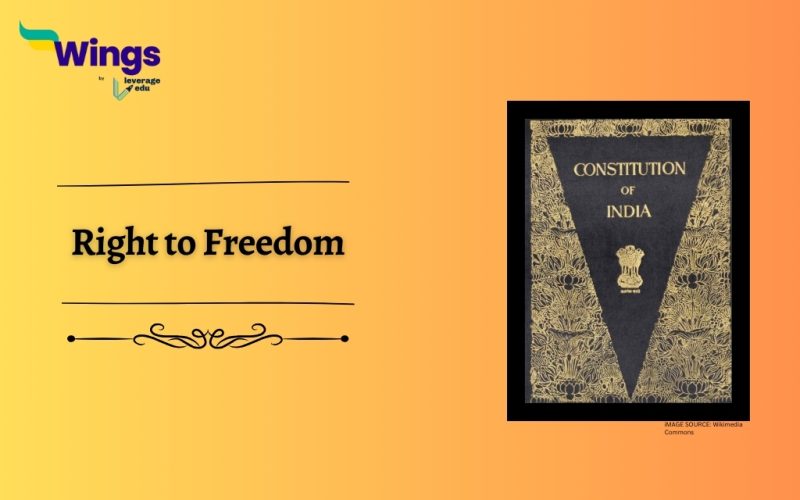Articles 19 through 22 of the Indian Constitution’s Right to Freedom grant citizens a number of basic liberties. These include the freedoms of speech and expression, associational freedom, personal liberty, and the right to lead a dignified life, among others. In the purpose of maintaining public order, morality, and decency as well as India’s sovereignty and integrity, this right is limited by reasonable limitations. Among the fundamental liberties protected by the Indian Constitution is the right to freedom. Understanding what this Right to Freedom (Article 19-22) comprises and encompasses is crucial.
Table of Contents
What is the Right to Freedom – Articles 19 to 22?
Fundamental rights are fundamental freedoms that are acknowledged as being necessary for preserving human dignity and liberties. These rights, which include freedom of expression, religion, and association as well as safeguards against discrimination, torture, and enslavement, are often established in a nation’s constitution or international treaties.
- It is one of the six fundamental liberties that the Indian Constitution provides to its citizens.
- It includes freedom of expression and speech, assembly, association, movement, and religion, which is guaranteed by the Indian Constitution to all of its inhabitants. Additionally, it provides protection from arbitrary imprisonment and discrimination based on one’s place of birth, race, caste, or religion.
- The essential liberties protected by Articles 19 through 22 are referred to as the “Right to Freedom” in the Indian Constitution. These liberties are meant to safeguard the freedoms listed in the Declaration of the newly independent nation of India, to end particular injustices, and to ensure that all people have the right to live with dignity.
Also Read: What Is Nationalism? Definition, History, and Significance
| Article | Description |
| Article 19 | Freedoms under Article 19 are: Speech and Expression Assembly Association Movement Residence Profession |
| Article 20 | Protection from being convicted of crimes |
| Article 21 | Right to life and personal liberty |
| Article 21(A) | Right to elementary education |
| Article 22 | Protection against arrest and detention in certain cases |
This right in the Indian Constitution ought to encompass preserving a proper balance between individual rights and the larger public interest, fostering civic engagement, bolstering institutions, encouraging digital freedom promotion by the government and others, and safeguarding vulnerable communities. This will guarantee sure the right to freedom stays a crucial component of our nation’s democracy and of the political, economic, and social progress we are making.
Also Read: What is federalism?
Article 19 of the Indian Constitution
Article 19 of the Indian Constitution offers six freedoms to citizens including:
1. Freedom of speech and expression:
It guarantees citizens of India the freedom of speech and expression. Nonetheless, the State can impose certain restrictions on this right according to the integrity and security of the country as well as its relations with other nations.
2. Freedom to assemble
Citizens of India can assemble peacefully without arms according to the State. However, it can impose certain legitimate limitations to protect the sovereignty and integrity of the country and to maintain law and order.
3. Freedom to form associations
This right in the Indian Consitution empowers workers to form a trade union. Again, the State can impose restrictions on the ground of protecting national interests. However, the Police Forces (Restriction of Rights) Act of 1966 prohibits police personnel from forming trade unions.
Also Read: Unicameral and Bicameral Legislature: Meaning, Characteristics, Differences
4. Freedom to move freely
Any citizen of India can move freely throughout the country as and when required. However, the State can disallow citizens from doing so on the account of securing the interests of the country.
5. Freedom of residence
Citizens of India have residence in any part of the country.
6. Freedom of profession
All citizens of India have the right to conduct any business or trade only if the occupation is not illegal or immoral.
Also Read: The Directive Principles of State Policy
What is the Significance of the Right to Freedom?
This law of the Indian Constitution holds great significance in the Constitution of India for different reasons such as:
- It safeguards the rights of freedom of the citizens of India.
- It prevents discrimination based on race, religion, gender, and other factors.
- It contributes to social progress and development.
- The Right to Freedom of the Indian constitution upholds the dignity of every individual.
Quiz on Right to Freedom
Results
#1. Which article does not come under Right to Freedom?
#2. What kind of freedom comes under Article 20
#3. Right to elementary education comes under which article?
Related Blogs
| Separation of Powers in a Democracy | Representative Democracy |
| The Making of Indian Constitution | Basic Structure Doctrine |
| Important Articles in Indian Constitution | Article 80 |
FAQs
Article 21 of the Indian Constitution has two rights: the Right to Life and Personal Liberty. It also states that “No person shall be deprived of his life or personal liberty except according to a procedure established by law.”
Articles 19 to 22 of the Indian Constitution provide citizens with the right to freedom that aims to protect fundamental rights such as freedom of personal life, freedom of speech and expression, and so on.
The six fundamental rights of the Indian constitution include the freedom of speech and expression, profession, assembly, residence, movement, and association.
This was all about the Right to Freedom. Visit our General Knowledge Page to discover more intriguing articles about Civics and Polity. Get in touch with the experts at Leverage Edu in order to kickstart your study abroad journey!
 One app for all your study abroad needs
One app for all your study abroad needs
















